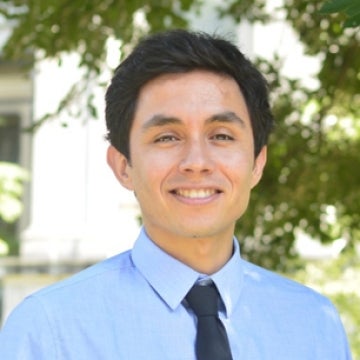
Francisco Castro
- Auctions
- Market Design
- Online Display Advertising
- Operations Management
- Revenue Management
- Ride-Hailing Platforms
Biography
Francisco Castro joined the UCLA Anderson School of Management faculty in 2020. His work focuses on the operations and design of markets, with emphasis on their spatial and incentive aspects. He was previously a postdoctoral research scientist at Uber.
Castro develops models that capture the fundamental aspects of markets, using solid and rigorous theory that lead to a better understanding of those markets, as well as to the discovery of new areas of application. “Since very early I have had an entrepreneurial spirit and a fascination for solving problems and gaining a better understanding of how things work,” he says. “The perfect compromise between my two early interests in business and the sciences was to study applied mathematics and operations management.”
He is particularly interested in the design of optimal pricing policies and contracts that can be used in digital marketplaces such as ride-hailing platforms. His research on surge pricing (forthcoming in Management Science) led him and his co-authors to propose a two-dimensional framework in which a platform selects prices for different locations, and drivers respond by choosing where to relocate in equilibrium based on prices, travel costs and driver congestion levels. “The study analyzes the short-term pricing problem faced by a ride-hailing platform,” says Castro. “The general methodology we developed may be leveraged to compute parametric global solutions to the platform’s problem. But the framework and ideas could be leveraged in settings beyond ride-hailing to study problems in which agents have different types characterized by high-dimensional vectors.”
Amid the economic upheaval resulting from pandemic, he says, “Having a diversified business can help platforms to mitigate adverse demand conditions by shifting some of their supply partners to markets that have experienced an increase in demand. Uber has put special attention to the ‘delivery of things’ by expanding its products and acquiring delivery companies. However, shifting supply from rides to food delivery isn’t as simple as it sounds, because if too many drivers are accepting only the more profitable and abundant requests, then there might not be enough drivers left for standard rides to run smoothly. As a result, it is crucial that Uber develop dispatching protocols that consider drivers’ incentives. My research at Uber provides practical insights on how to design these protocols in a way that maintains good overall marketplace performance, while still allowing drivers the flexibility to decide which types of requests to take.”
Castro plans to take these lessons into the classroom, where the next generation of industry leaders will be preparing for an uncharted economy. “Post-crisis, our MBA students will be facing a very different business landscape. Thinking creatively in response to new consumer behavior can lead to significant innovations — even brand new applications or markets.”
Education
Ph.D. Decision, Risk and Operations, 2020, Columbia University Graduate School of Business
M.S. Mathematical Engineering, 2014, University of Chile Santiago, Chile
B.S. Engineering Sciences, 2013, University of Chile Santiago, Chile
Publications
Francisco Castro, Santiago Balseiro, Omar Besbes. Mechanism Design with Approximate Incentive Compatibility. Operations Research, 2022.
Francisco Castro, Dirk Bergemann, Gabriel Weintraub. Third-degree Price Discrimination Versus Uniform Pricing. Games and Economic Behavior, 2022.
Francisco Castro, Omar Besbes, Ilan Lobel. Surge Pricing and its Spatial Supply Response. Management Science, 2021.
Francisco Castro, Omar Besbes and Ilan Lobel. Spatial Capacity Planning. Operations Research, 2021.
Francisco Castro, Dirk Bergemann, Gabriel Weintraub. The Scope of Sequential Screening with Ex-post Participation Constraints. Journal of Economic Theory, 2020.
Francisco Castro, Hamid Nazerzadeh, Chiwei Yan. Matching Queues with Reneging: a Product Form Solution. Queueing Systems, 2020.
Francisco Castro, Hongyao Ma, Hamid Nazerzadeh and Chiwei Yan. Randomized FIFO Mechanisms. Major Revision in Management Science.
Francisco Castro, Andrew E. Frazelle. Getting Out of Your Own Way: Introducing Autonomous Vehicles on a Ride-Hailing Platform. Major Revision in Production and Operations Management.
Francisco Castro, Sushil Mahavir Varma and Siva Theja Maguluri. Power-of-d Choices Load Balancing in the Sub-Halfin Whitt Regime. ACM SIGMETRICS 2023, conference proceedings.
Francisco Castro, Sushil Mahavir Varma and Siva Theja Maguluri. Near Optimal Control in Ride Hailing Platforms with Strategic Servers. ACM SIGMETRICS 2021, conference proceedings.
Francisco Castro, Peter Frazier, Hongyao Ma, Hamid Nazerzadeh, Chiwei Yan. Matching Queues, Flexibility and Incentives. Working paper.
Francisco Castro, Jian Gao and Sébastien Martin. Autonomous Vehicles in Ride-Hailing and the Threat of Spatial Inequalities. Working paper.
Francisco Castro, Rafael Epstein, Denis Sauré. Optimal Timing of a Multi-Stage Project Under Market Uncertainty. Working paper.